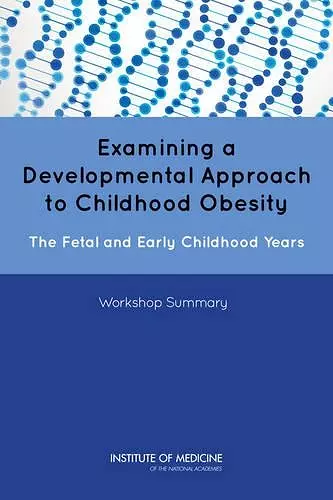Examining a Developmental Approach to Childhood Obesity
The Fetal and Early Childhood Years: Workshop Summary
Institute of Medicine author Food and Nutrition Board author Leslie A Pray editor
Format:Paperback
Publisher:National Academies Press
Published:8th Oct '15
Currently unavailable, and unfortunately no date known when it will be back

Recent scientific evidence points to the origins of childhood obesity as an outcome of the dynamic interplay of genetic, behavioral, and environmental factors throughout early development, with a compelling body of evidence suggesting that both maternal and paternal nutritional and other exposures affect a child's risk of later obesity. The burgeoning field of epigenetics has led researchers to speculate that many of the observed associations between early developmental exposures and later risk of childhood obesity are mediated, at least in part, through epigenetic mechanisms.
To explore the body of evolving science that examines the nexus of biology, environment, and developmental stage on risk of childhood obesity, the Institute of Medicine and the National Research Council convened a workshop in February 2015. The workshop focused on the prenatal period, infancy, and early childhood and addressed evidence from both animal and human studies. Workshop objectives were to (1) identify epigenetic-mediated relationships between exposure to risk factors during sensitive periods of development (gestation through age 3) and subsequent obesity-related outcomes; (2) explore the science around periods of plasticity and potential reversibility of obesity risk in the context of early childhood development; and (3) examine the translation of epigenetic science to guide early childhood obesity prevention and intervention to reduce obesity risk. This report summarizes the information presented and discussed at the workshop.
Table of Contents- Front Matter
- 1 Introduction
- 2 Conceptual Overview of the Role of Epigenetics in Childhood Obesity
- 3 Etiology and Causal Inference
- 4 Opportunities for Intervention and Prevention
- 5 Real-World Application
- 6 Data Gaps and Future Directions
- References
- Appendix A: Workshop Agenda
- Appendix B: Speaker Biographies <
ISBN: 9780309376952
Dimensions: unknown
Weight: unknown
170 pages